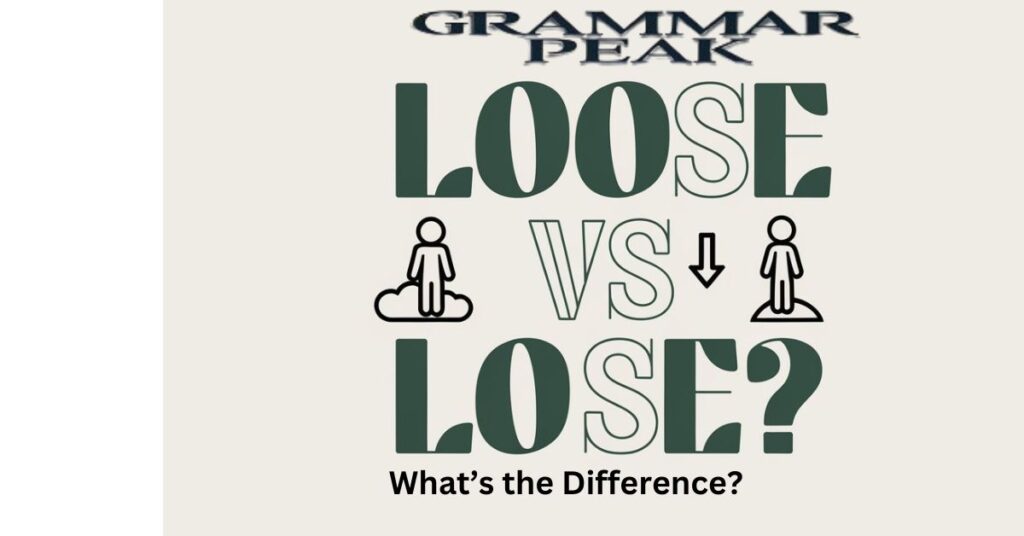Especially with commonly confused words like “Loose vs Lose.” These two words, often mistaken due to their similar pronunciations, have entirely different meanings and uses. In this article, we’ll unpack the differences between “loose” and “lose,” offering grammar tips to help you understand when to use each one.
We’ll explore their meanings, origins, and synonyms, providing examples of their usage in sentences. This comprehensive guide will serve as your go-to resource for demystifying the confusion between these two words, and enhancing your English grammar skills.
Why is There Confusion?
The confusion between “loose” and “lose” often arises from their similar spellings and pronunciations. Despite being just one letter apart, these two words carry entirely distinct meanings. This closeness in spelling, however, can lead to mix-ups, especially for those new to the English language or even native speakers who don’t pay close attention to their writing.
Another contributing factor to the confusion is the inconsistent rules of English pronunciation. For example, “lose” rhymes with “choose,” which is contrary to what one might expect given its spelling. On the other hand, “loose” rhymes with “goose,” which aligns more with our expectations.
The key to avoiding this common mistake lies in understanding the different meanings and uses of “loose” and “lose”. With practice, it becomes easier to choose the correct word based on the context. The more you write and read in English, the more these distinctions will become second nature. Remember, “loose” is usually an adjective describing something not tight or contained, while “lose” is a verb meaning to misplace something or fail to win.
You will like Loose vs Lose: What’s the Difference and When to Use Each?
What Does the Word “Loose” Mean?
In English grammar, “loose” primarily serves as an adjective, but can occasionally function as a verb as well. As an adjective, “loose” is used to describe something that isn’t tightly fixed in place or isn’t securely fastened. For instance, you might say, “I need to tighten my loose shoelaces,” where “loose” describes the state of the shoelaces.
As a verb, “loose” is less commonly used and generally means to set free or unleash. In the sentence “The hunter decided to loose the trapped bird,” “loose” refers to the act of freeing the bird from a trap. Understanding these two uses of “loose” can help you avoid commonly confused words and enhance your English language usage.
What Does the Word “Lose” Mean?
In contrast to “loose,” “lose” is solely used as a verb in the English language. It carries several meanings, all connected by the common thread of loss or absence. One of the most common uses of “lose” is to denote the act of misplacing something.
Additionally, “lose” can also indicate the failure to win or succeed in something. In a sentence like, “I don’t want to lose the match,” “lose” represents the possibility of not winning. Understanding the various uses of “lose” is essential for accurate English language usage and can help to prevent mix-ups between these two commonly confused words.
Read must Be Loose vs Lose: What’s the Difference and When to Use Each?
“Loose” vs “Lose”: The Differences
Part of Speech
- In the sentence “She will run a marathon,” “run” is the main verb, an important part of speech.
- Pronouns, another essential part of speech, replace nouns in sentences, like “he” in “He is my best friend.”
- Adjectives, a key part of speech, describe or modify nouns, as “beautiful” does in the sentence “It’s a beautiful day.”
- In the phrase “Quickly run,” “quickly” is an adverb, a part of speech that modifies verbs, adjectives, or other adverbs.
- Interjections, a less common part of speech, express emotions or reactions, as in “Wow! That’s amazing.”
- Prepositions, a crucial part of speech, show the relationship between a noun (or pronoun) and another word in the sentence, as “on” does in “The book is on the table.”
- Conjunctions, a connecting part of speech, link words, phrases, or clauses, like “and” in “I like apples and oranges.”
- Determiners, another vital part of speech, modify nouns to clarify them, as “the” does in “I love the beach.”
Meaning and Usage
- The meaning of the word “duplicate” can vary based on its usage; it can refer to an exact copy of something or the act of making an exact copy.
- Keywords have specific meanings in the context of SEO, and their usage can significantly impact a website’s visibility.
- The usage of the word “duplicate” in a sentence can change its meaning, as seen in the sentence “I need to duplicate this report for the meeting”.
- The meaning of a word can remain the same, but its usage can vary based on the context, as seen with the word “duplicate”.
- Understanding the meaning and usage of words can help avoid redundancy in writing.
- The meaning of “duplicate” in the context of content creation refers to identical or very similar content appearing in more than one place, and its usage can lead to SEO issues.
- The meaning of “non-repeating” in a sentence refers to words that appear only once, and its usage can help identify unique elements in a text.
- The meaning of “duplicated” in a research context often refers to results that have been replicated in other studies, and its usage can indicate the reliability of the findings.
Sure, here’s a table to demonstrate the differences between the two words “Loose” and “Lose”.
| Loose | Lose | |
| Part of Speech | Adjective, Verb | Verb |
| Meaning | Not tightly fastened, attached, or held; to release or set free | To misplace or no longer possess; to fail to win |
| Example | The knot was loose. / The horse was loosed in the field. | I always lose my keys. / They didn’t want to lose the game. |
| Pronunciation | Rhymes with “goose” | Rhymes with “choose” |
Synonyms For “Loose” and “Lose”
Synonyms for “Loose”
- The unsecured knot allowed the boat to drift away from the dock.
- The slackened rope made it difficult for the climbers to maintain their grip.
- The relaxed regulations led to an increase in new businesses.
- The lax security at the event raised concerns among the attendees.
- The unfastened buttons on his shirt gave him a casual look.
- The detached wires caused the machine to stop working.
- The unfixed tiles on the roof led to a leak during the rainstorm.
- The unbound pages of the book were scattered all over the floor.
- The unrestrained dog ran around the park, chasing after squirrels.
- The unanchored ship was at the mercy of the stormy sea.
- The liberated bird flew out of its cage and into the open sky.
- The unhinged door swung wildly in the wind, making a loud noise.
Synonyms for “Lose”
- I misplaced my keys and now I can’t find them anywhere.
- The team forfeited the match due to the absence of key players.
- I misfiled the document and now I can’t locate it in my files.
- The hiker mislay his map and had to rely on his memory to find his way back.
- The company suffered a significant loss after the market crash.
- The player yielded his leading position in the game due to a sudden injury.
- The businessman forfeited his shares in the company after a major disagreement.
- The child misplaced his toy and started crying.
- The team was defeated in the final round of the tournament.
- The explorer lost track of his location in the dense forest.
- The investor suffered the loss of a significant amount of money in the stock market crash.
- The tourist was unable to find his passport and had to report it to the authorities.
Examples in Context
Examples of “Loose”
- The dog was wandering loose in the streets, causing a bit of a commotion.
- The soldiers loosed a volley of rifle fire, causing the enemy to retreat.
- Some of the shingles on the roof had come loose due to the strong winds.
- The boat came loose from its moorings and floated out into the harbor.
- The ball popped loose from the shortstop’s glove during the intense baseball game.
- One of the screws in the chair is loose, causing it to wobble.
- This tooth feels very loose, I might need to visit the dentist soon.
- Loose clothing gives you greater freedom of movement, especially during workouts.
- Her hair was free, the long, loose curls cascading down her shoulders and back.
- After tying up loose ends on the house, the carpenter gave the painter approval to begin work.
- The journalist was accused of playing fast and loose with the facts in the editorial he wrote.
- The boatman loosed the ropes and cast off, beginning the journey down the river.
Examples of “Lose”
- Don’t lose sight of what’s really important in life.
- He managed to lose his pursuers in the crowded market.
- If we don’t leave now, we’ll lose our reservation at the restaurant.
- She always seems to lose her keys when she’s in a hurry.
- I lose patience with him when he doesn’t stick to the agreed plan.
- If they continue to play poorly, they’ll lose the game.
- It’s easy to lose track of time when you’re enjoying yourself.
- The company stands to lose a significant amount of money if the deal falls through.
- We must not lose hope even when things seem bleak.
- The hiker managed to lose his way in the dense forest.
- He tends to lose his temper when confronted with criticism.
- The magician made it look like he could lose himself in the crowd and then suddenly appear on the stage.
Origins of “Loose” and “Lose”
Origins of “Loose”
The term “loose” hails from Old English and has been a part of the English language for centuries. The Old English word “lēas” was used to denote the absence of something, and over time, it evolved into the Middle English word “lose”. In the Middle English period, the spelling of the term transitioned into “loose”.
The word was used to describe something that wasn’t tightly fastened or constrained or something free from attachment. The word “loose” is also related to the Old Norse word “lauss”, which means “free” or “unattached”. This connection reflects the influence of the Viking invasions on the English language during the Middle Ages.
Origins of “Lose”
The term “lose” has a historical and linguistic journey that can be traced back to the Old English word “losian,” which meant “to perish” or “to become lost.” This term “losian” itself originated from an even older Proto-Germanic word “luzēną.” “Luzēną” had a similar meaning of loss or destruction, underlying the word’s tether to concepts of misplacement and defeat.
As English evolved, so did the meaning and usage of “lose.” In the Middle English period, the term started to gain additional meanings like “fail to win” or “misplace.” The word “lose” is also linked to the Old High German word “lōsēn,” which means “to perish.”
FAQ” S
What is the main difference between “loose” and “lose”?
The main difference lies in their meanings and usage. “Loose” usually refers to something not tightly fastened or free, while “lose” typically means to misplace or fail to win.
Can “loose” and “lose” be used interchangeably?
No, “loose” and “lose” cannot be used interchangeably due to their different meanings and usage in English grammar.
What part of speech is “loose” and “lose”?
“Loose” can function as both an adjective and a verb, while “lose” is only a verb.
What are some synonyms for “loose” and “lose”?
Some synonyms for “loose” include “unfastened,” “free,” “slack,” and “unrestrained.” Synonyms for “lose” include “misplace,” “forfeit,” “mislay,” and “surrender.”
What are the origins of “loose” and “lose”?
The word “loose” comes from the Old Norse word “lauss,” meaning free or unattached. “Lose” originates from the Old English word “losian,” which means to perish or destroy.
Conclusion
Understanding the difference between “loose” and “lose” can significantly improve your writing precision and vocabulary distinctions. Remember, “loose” usually refers to something not tightly fastened or free, and “lose” typically means to misplace or fail to win. Keep these English language tips in mind to avoid commonly confused words and enhance your writing.

Mason Blake is an experienced blogger with a passion for language and communication. With years of expertise in crafting informative and engaging content, Mason shares valuable insights on grammar and writing. His clear, concise, and reader-friendly approach has earned him a loyal following, helping readers sharpen their language skills and master the art of effective communication.








Can you be more specific about the content of your article? After reading it, I still have some doubts. Hope you can help me.
I don’t think the title of your article matches the content lol. Just kidding, mainly because I had some doubts after reading the article.
I don’t think the title of your article matches the content lol. Just kidding, mainly because I had some doubts after reading the article.
What’s up to every , for the reason that I am in fact
eager of reading this web site’s post to be updated
on a regular basis. It consists of fastidious data.
I’m not sure exactly why but this blog is loading incredibly slow for me.
Is anyone else having this problem or is it a issue on my end?
I’ll check back later on and see if the problem still exists.